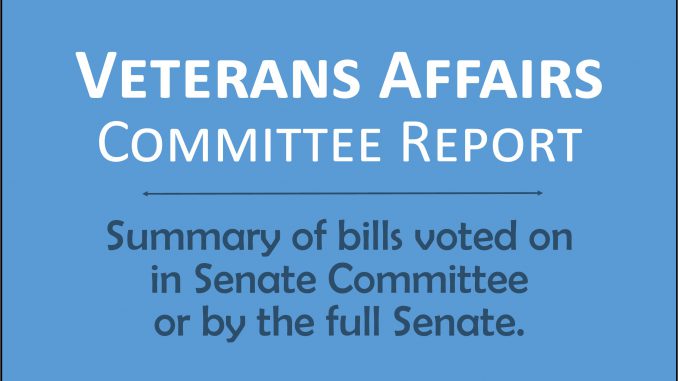
SF 2366 – IDVA omnibus;
HF 2355 – Oxygen treatment pilot program for eligible veterans.
FLOOR ACTION:
SF 2366 is based on recommendations from the Iowa Department of Veterans Affairs and the Iowa Commission of Veterans Affairs. It increases the number of members on the Commission from nine to 11. The new members will represent the Paralyzed Veterans of America and the Iowa Association of County Commissioners and Veteran Service Officers. The appointees are selected from names submitted by the organizations. The bill increases the amount that may be spent each fiscal year from the Veterans Trust Fund from $300,000 to $500,000, which is transferred to the fund from the Iowa Lottery Authority from lottery revenues. It also authorizes the Trust Fund to grant up to $1,000 to qualified individuals for rental housing assistance (e.g., application fees) or one-time monetary assistance to prevent homelessness. This does not include rent payments, which is under Housing and Urban Development and other federal programs.
[3/12: 49-0]
COMMITTEE:
HF 2355 creates a veterans recovery pilot program, and establishes a veterans recovery fund in the State Treasury under the control of the Iowa Department of Veterans Affairs (IDVA). The fund will reimburse expenses for providing hyperbaric oxygen treatment to eligible veterans. No state appropriations are needed. Donations, grants, gifts and other contributions will be deposited in the fund. No veteran will receive treatment until there are sufficient funds to cover the cost.
The bill defines hyperbaric oxygen treatment and authorizes it as a diagnostic test and other related medical treatments for traumatic brain injury or post-traumatic stress disorder (PTSD) if prescribed by a health care practitioner who uses a hyperbaric chamber or hyperbaric oxygen device approved by the U.S. Food and Drug Administration. The health care practitioner can prescribe this treatment and propose a plan that includes hyperbaric oxygen treatment. The plan must include an estimate of the cost for providing treatment, as well as for travel and living expenses related to treatment.
The proposal must be approved by the IDVA and the Commission of Veterans Affairs. If there is enough money in the fund to pay for treatment and related expenses, the treatment plan will begin.
The IDVA must submit notice of intended action to the administrative rules coordinator and administrative code editor by January 1, 2019 for rules to implement and administer the new Code chapter. The pilot program sunsets on July 1, 2024.
[3/14: short form]
